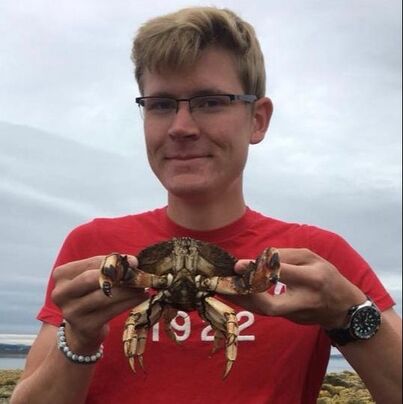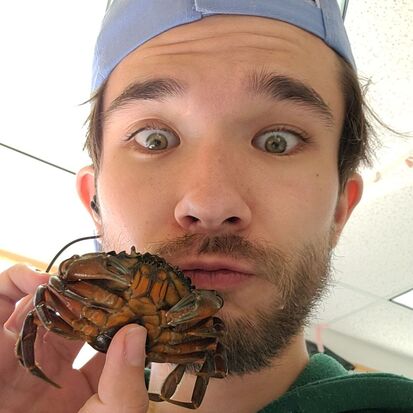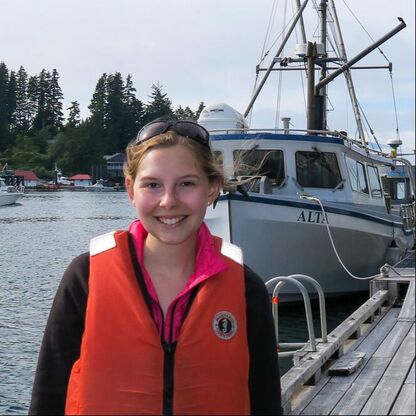RESEARCH TEAM
Dr. Tamzin Blewett (She/Her) (Principal Investigator)
|
My research is multidisciplinary (e.g., a skill set comprising core techniques in biology, physiology, toxicology, chemistry, biogeochemistry), with a specific focus in areas aligned with the protection of aquatic ecosystems and the biota therein. Much of my research effort has been focused on supporting the development of regulatory tools that not only seek to identify levels of aquatic contaminants that are likely to cause harm, but which set appropriate regulatory limits for our industrial economy. I am passionate about a sustainable future for Canadian waters.
CV 2024 - Associate Professor - University of Alberta, Canada 2019 - Assistant Professor - University of Alberta, Canada 2016-2018 - Post-Doctoral Fellow - NSERC Fellowship, University of Alberta, Canada 2015-2016 - Post-Doctoral Fellow - Wilfrid Laurier University, Canada 2011-2015 - PhD - McMaster University, Canada 2009-2011 - MSc - McMaster University, Canada 2004-2009 - BSc - Wilfrid Laurier University, Canada |
Graduate Researchers
Aaron Boyd (PhD Candidate)I obtained a BSc in Ecology from the University of Calgary in 2017 and joined UAlberta for my graduate studies in Fall 2018.
My primary research as a current PhD candidate is focused on the toxic effects of organic ultraviolet filter (UVF) exposure from sunscreens in freshwater and marine organisms. Many studies have sought to characterize the toxicity of UVFs; however, they have been largely restricted to short term studies and/or testing exposures at concentrations greatly exceeding what has been found in the environment. My thesis will address these knowledge gaps by testing long-term exposures at environmentally relevant concentrations to understand the effects of contamination to populations over multiple generations, as well as to identify the specific mechanisms of action for these compounds. It is important to understand the effects of UVF contaminants in realistic scenarios so that we can make informed policy decisions to better protect ourselves and the environment. Alberta Society of Professional Biologists Graduate Scholarship (2022) Best PhD Student Platform Presentation (1st) at the RE Peter Biology Conference (2022) Peter Chapman Outstanding Student Platform Presentation (1st) at the Canadian Ecotoxicology Workshop (2022) Foster (Sonny) Mayer Best PhD Student Poster Presentation (1st) at SETAC North America (2022) AGES Recipient (2019, 2021, 2022) Bill Shostak Wildlife Award (2023) William S. Hoar Best Student Presentation at the Canadian Society of Zoologists (2024) |
Rob Griffin (PhD Candidate)In May 2019 I completed my BSc at the University of Guelph in Marine and Freshwater Biology. In the final years of my undergraduate degree, I focused my research on the implications of variable environmental oxygen concentrations on the muscle function of Carcinus maenas, and completed a multi-level diversity assessment at the Huntsman Marine Science Centre. Upon starting my graduate research at the University of Alberta in 2020 I have been investigating the role of branchial amino acid uptake in crustaceans, with particular emphasis on the globally invasive green crab. Thus far, my research has shown that contrary to prior belief, branchial uptake of free amino acids is likely a shared trait among all crustacean species with both invasive and Canadian native crustaceans exhibiting species specific transport pathways. In the future, my research will investigate the role of waterborne amino acid uptake in the survivability of C. maenas under changing environmental parameters. Throughout this research we hope to outline how these previously unknown transport pathways may play a key role in the invasive success of C. maenas around the world.
Society of Experimental Biology Travel Grant (2022) |
Sienna Overduin (PhD Candidate)During my undergraduate degree I completed a thesis project in Dr. Tierney’s lab at the University of Alberta, investigating appetite stimulants in zebrafish which initiated my interest in research. After graduating with a BSc from the University of Alberta I began my graduate studies with Dr. Blewett investigating the influence of metal exposure on the social dynamics of various fish species. Using multidisciplinary techniques including behavioural and biochemical analyses to understand whole body, as well as sub-cellular effects. The interplay between toxicology and social behaviour is not well understood but may be critical for understanding how species respond to anthropogenic stressors.
Dr. R E Peter Memorial Scholarship (2022) CPB Student Research Grant through the Canadian Society of Zoologists (2022) Company of Biologists Travel Grant through Society of Experimental Biology (2022) J Gordin Kaplan Graduate Student Award (2022) ICBF Travel Award (2022) AGES Recipient (2021, 2022) |
Connor Stewart (PhD Candidate)I completed my undergraduate studies at the University of Alberta in 2020, with a BSc in Biological Sciences with specialization in Integrative Physiology. My undergraduate research in the Blewett lab investigated the toxic effects of ultraviolet filters, the active ingredients in sunscreens, to the aquatic invertebrate Daphnia magna. For my PhD I will be investigating the implications of anthropogenic nickel contamination on multiple aquatic and marine species in arctic and subarctic waters. Rich nickel reserves found in the Arctic are being increasingly utilized, leading to increased environmental nickel load due to mining and smelting operations in the area. The implications of such nickel contamination need to be further investigated as the unique hydrogeochemistry of Arctic waters may alter nickel toxicity, preventing accurate extrapolation of existing risk assessment from other waters. The multi-species approach my research is taking will help develop our understanding of nickel toxicity in Arctic waters, with the ultimate goal of utilizing these findings to help develop our understanding of the risk nickel poses to waters in unique arctic environments.
NSERC CGSM Steve and Elaine Antoniuk Graduate Scholarship in Arctic Research (2022) Martin J Paetz Memorial Graduate Award in Fisheries Management (2022, 2023) Dr Richard E Peter Memorial Graduate Scholarship (2023, 2024) Donald M. Ross Scholarship (2023) Jennifer Robinson Memorial Scholarship (2024) |
Dustin Doty (MSc Candidate)Throughout my undergraduate degree, I had the privilege of participating in various research projects. Notably, I collaborated with Dr. Paul LaPointe on the development of augmented reality (AR) smartphone apps for radiology students, and I also worked alongside Dr. Keith Tierney to investigate how different stressors impact sensory experiences and memory. After receiving my BSc in Biological Sciences from the University of Alberta in 2023, I decided to keep the thrill of physiology alive and join the Blewett lab in pursuit of an MSc.
My current research seeks to characterize the physiological capacity and tolerances of one of Canada’s greatest adversaries, the invasive European Green Crab (Carcinus maenas). Their procreative ability instills fear in any regulatory agency as almost 200,000 baby crabs, or larvae can be released in a single clutch. The survival of these larvae is crucial for this species’ success and persistence, consequently, I seek to determine the water parameters they can plausibly survive in. We aim to investigate this across 3 different populations to explore how the European Green Crab has physiologically changed after they so graciously ‘invaded’ from Europe. NSERC CGS-M (2023) University of Alberta Graduate Recruitment Scholarship (2023) Walter H Johns Memorial Graduate Fellowship (2023) |
Fleur Issac (MSc Candidate)
|
Jenelle McCuaig (MSc Candidate)I received my Bachelor of Science degree with Specialization in Integrative Physiology from the University of Alberta in 2022. During my undergraduate research in the Blewett Lab, I studied the effects of copper toxicity on the invasive European green crab (Carcinus maenas), incorporating both behavioral and physiological aspects. For my Master’s project, I will be studying oil sands process-affected water (OSPW) toxicity, specifically the naphthenic acid fraction, using water fleas (Daphnia magna) as a model organism in collaboration with Environment and Climate Change Canada. I will utilize a multigenerational approach and proteomics to better understand the long-term effects of naphthenic acids and the potential for oil sands recovery and remediation.
NSERC CGSM |
Brittany Sauter (PhD Student) Co-Supervised w/Dr. Lisa SteinIn April 2021 I obtained my BSc Specialization degree from the University of Alberta in Ecology, Evolution and Environmental Biology; however, my focus throughout my degree was environmental microbiology. During my undergraduate research courses (399 & 499) I joined Dr. Lisa Stein's lab focusing on aquaponics systems and how microorganisms can adapt to optimize plant and fish growth while creating negligible nitrous oxide emissions.
I joined Dr. Stein and Dr. Blewett for my MSc in Microbiology and Biotechnology in January of 2021. With my goal of understanding how the gill microbiome of Carcinus maenas may be providing an advantage compared to the native crab species on the west coast of Canada. Understanding the relationship between microorganisms and animals is something that has not been explored to date in Carcinus maenas; however, in other species has shown to have an interaction. Recognizing how communities of microorganisms can be potentially assisting Carcinus maenas providing the upper hand in new environments is the main goal of my thesis. |
Hannah Lowes, MSc
|
Current Undergraduate Students:
Sidney Martin (399)
Kayla Lottin (499) co-supervised with Dr. Zach Hall
Ally Legge (399)
Mathias Segura Castillo (399)
Keelie Phillips (499)
Lab Alumni
Postdoctoral Fellows:
Dr. Patrick Gauthier (2020-2021)
MSc Thesis Students:
Ivy Luu (2020-2022)
Hannah Lowes (2021 -2023)
BSc Honours (499, 498, 399, 398)
2022-2023
Emma Carry (498)
Caroline MacDonald (399)
Grace Mamo (499) - NSERC USRA (summer 2023)
Sidney Martin (499) - NSERC USRA (summer 2023)
Dustin Doty - NSERC USRA (summer 2023)
Kayla Lottin (399) co-supervised with Dr. Zach Hall- NSERC USRA (summer 2023)
Ally Legge (398, 498)
2021-2022
Jenelle McCuaig (499)(NSERC USRA) (2020, 2021, 2022)
Nina Lawrence (499)
Kazeem Abolaji (499)
Emilie Petryshen (399)
Michelle Makila (399)
2020-2021:
Gurvinder Dhaliwal (399)
Alejandro Escobar-Lopez (499)
2019-2020:
Sunil Myers (499)
Hannah Lowes (499) (NSERC USRA)
Connor Stewart (499)
Sidney Martin (399)
Kayla Lottin (499) co-supervised with Dr. Zach Hall
Ally Legge (399)
Mathias Segura Castillo (399)
Keelie Phillips (499)
Lab Alumni
Postdoctoral Fellows:
Dr. Patrick Gauthier (2020-2021)
MSc Thesis Students:
Ivy Luu (2020-2022)
Hannah Lowes (2021 -2023)
BSc Honours (499, 498, 399, 398)
2022-2023
Emma Carry (498)
Caroline MacDonald (399)
Grace Mamo (499) - NSERC USRA (summer 2023)
Sidney Martin (499) - NSERC USRA (summer 2023)
Dustin Doty - NSERC USRA (summer 2023)
Kayla Lottin (399) co-supervised with Dr. Zach Hall- NSERC USRA (summer 2023)
Ally Legge (398, 498)
2021-2022
Jenelle McCuaig (499)(NSERC USRA) (2020, 2021, 2022)
Nina Lawrence (499)
Kazeem Abolaji (499)
Emilie Petryshen (399)
Michelle Makila (399)
2020-2021:
Gurvinder Dhaliwal (399)
Alejandro Escobar-Lopez (499)
2019-2020:
Sunil Myers (499)
Hannah Lowes (499) (NSERC USRA)
Connor Stewart (499)










